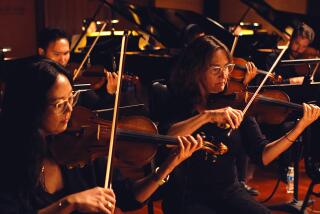Book review: Gary Marcus’ ‘Guitar Zero’
- Share via
Spending countless hours playing the video game Guitar Hero has fostered an illusion among many middle-age guys. It’s not too late to be a guitar god.
Then they discover something: There’s a big difference between the colored plastic buttons on the guitar-shaped game control and the six strings of an actual guitar. But is the difference insurmountable? Gary Marcus set out to answer that question in “Guitar Zero: The New Musician and the Science of Learning.”
“I had a sabbatical coming up,” says Marcus, a psychology professor at New York University. “I decided to see what would happen if I devoted myself to music full time, for a month or two — or as long as I could stand. If someone as tuneless as I could make progress, perhaps there was hope for anyone.”
Marcus’ journey may have started because he wanted to rock, but he’s also director of NYU’s Center for Language and Music. This book in the end is about more than a desire to shred like Eddie Van Halen. Marcus examines how our brains are affected by creativity — learning a musical instrument, for instance, or a new language — and how these experiences remain open to all of us, no matter our age.
How? By practice. Practice spurs brain growth, he says. It causes the brain to take what it learns and shift it from explicit to implicit — a process he calls “proceduralization.” That’s why the beginning guitarist struggles to bend a string but a practiced player bends the same note seemingly without any effort. The whole exercise moves, thanks to the brain, to a deeper, visceral level — that’s the level at which great musicians play.
It’s also the level that a young child reaches more quickly than an adult, but that doesn’t mean adults should give up. The fact is, Marcus says, “a musical mind develops only if we put in years of hard work … in which parts of the brain that evolved for other purposes such as language … are gradually co-opted into doing something new.”
It sounds as if Marcus were stating the obvious — “Practice makes perfect,” right? — but his book looks far more deeply into the ways our brains rewire themselves and find ways to compensate for certain gaps or deficits in our abilities.
In the process of demonstrating these, Marcus sounds an encouraging note (pun intended) for older readers who have always wanted to do something but have never had time.
The reason for learning anything, whether it’s guitar (Marcus succeeds, playing well enough to perform before a Brooklyn audience), Guitar Hero or Mandarin Chinese, isn’t perfection or virtuoso skill. The motive is far simpler: bliss. Learning makes us happy, and it provides us with feelings of control and novelty, Marcus concludes in this thoughtful study, that are crucial to our psyches.
“[M]aybe, just maybe,” he says, “the art of reinvention and acquiring new skills can give us a sense of a life well lived.”
Rock on.
Marcus will visit L.A. on Feb. 24 for a Zócalo Public Square event at the Museum of Contemporary Art, https://www.zocalopublicsquare.org.
More to Read
The biggest entertainment stories
Get our big stories about Hollywood, film, television, music, arts, culture and more right in your inbox as soon as they publish.
You may occasionally receive promotional content from the Los Angeles Times.










